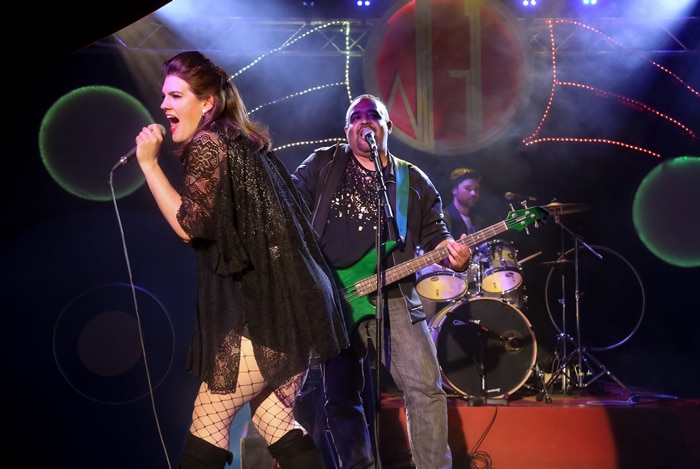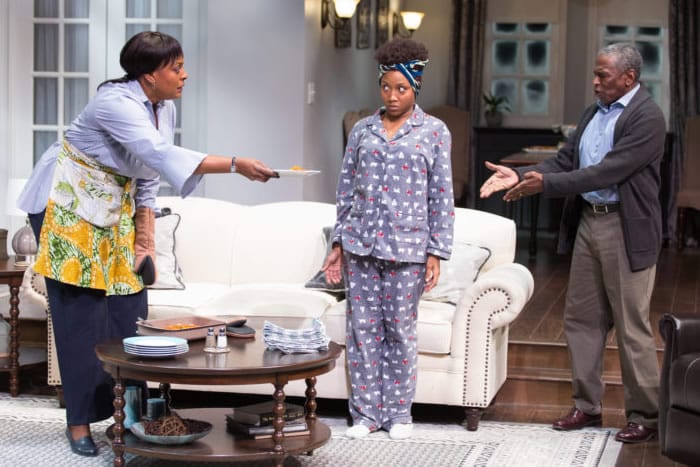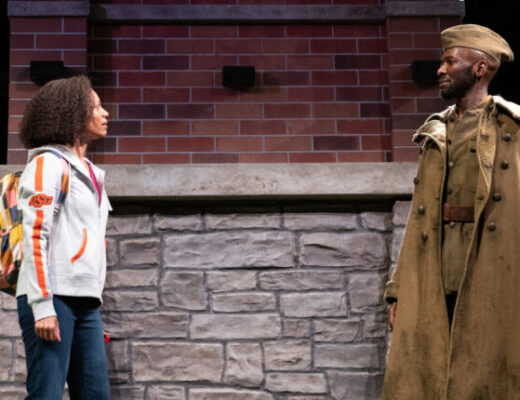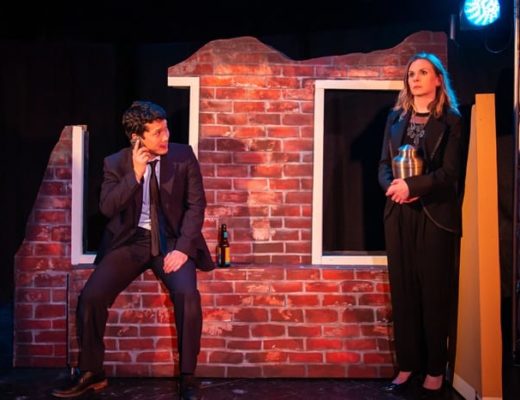by John Bavoso
This article was first published by DC Theatre Scene and can be found on their site here.
When asked about how she comes up with ideas for her plays (which, let me tell you from personal experience, is every writer’s favorite interview question), playwright, director, and filmmaker Young Jean Lee has said that she focuses in on what scares her the most to write about at that particular moment in her life and then dives in head-first. Sometimes this results in a show that’s about a very specific topic—privilege, for example, in the case of her hit play Straight White Men, which made history by being the first work by an Asian-American woman playwright produced on Broadway… in 2018.
But in the aptly named We’re Gonna Die, Lee tackles what is perhaps the most universally frightening subject of all—our own mortality—through an irreverent combination of storytelling and song. In a new production ably directed by Josh Sobel and featuring the captivating Farrell Parker, Flying V has created what is easily one of the most hilarious, harrowing, and exhilarating experiences I’ve ever had in a Washington theater.
Review: Young Jean Lee’s We’re Gonna Die from Flying V
May 28, 2019 by John Bavoso Leave a Comment
Share this:
- Click to share on Twitter (Opens in new window)
- Click to share on Facebook (Opens in new window)
- Click to share on Pinterest (Opens in new window)
- Click to email this to a friend (Opens in new window)
- Click to print (Opens in new window)
When asked about how she comes up with ideas for her plays (which, let me tell you from personal experience, is every writer’s favorite interview question), playwright, director, and filmmaker Young Jean Lee has said that she focuses in on what scares her the most to write about at that particular moment in her life and then dives in head-first. Sometimes this results in a show that’s about a very specific topic—privilege, for example, in the case of her hit play Straight White Men, which made history by being the first work by an Asian-American woman playwright produced on Broadway… in 2018.

But in the aptly named We’re Gonna Die, Lee tackles what is perhaps the most universally frightening subject of all—our own mortality—through an irreverent combination of storytelling and song. In a new production ably directed by Josh Sobel and featuring the captivating Farrell Parker, Flying V has created what is easily one of the most hilarious, harrowing, and exhilarating experiences I’ve ever had in a Washington theater.

Before I get too far, a warning of sorts: this is a review that I’ve been both excited and terrified to write. Excited, frankly, because it’s an easy rave for a show I think everyone should see. But also terrifying, because in order to explain why I found We’re Gonna Die so profoundly moving, I have to get a little personal—and in doing so, reveal why Lee’s writing and Parker’s performance are so universally relevant. It’s a bit of vulnerability that I hope you’ll indulge me in.
But before we get to the show itself, we should start with the opening act. Flying V has enlisted local artists to go on before each performance. In the case of the first weekend of the run, Zia Hassan, a local singer-songwriter, kicked us off. With just an acoustic guitar and a voice that, to me, is akin to the bands that remind me of my college years—Dashboard Confessional and Jack’s Mannequin come to mind—I was instantly transported to a simpler, more innocent time in my life.
Many of the songs Hassan performed were about the recent birth of his son, which provided a poignant counterpoint to the examination of death and deterioration to follow. I don’t know if this pairing of subject matter was intentional on Flying V’s part, but it created a beautiful full-circle experience. I can’t vouch for the acts preceding the rest of the performances, but I hope they’re as appropriate and heartfelt as Hassan’s.
Following a brief, pre-show intermission, it was time to get downright rock ‘n’ roll existential! Lee developed and staged We’re Gonna Die with the since-dissolved self-producing playwrights’ collective 13 Playwrights Inc., a company not unlike DC’s own The Welders. The show featured Lee herself in the 2011 premiere at Joe’s Pub in New York, singing and speaking about her own (presumably heightened-just-a-touch) life experiences.
Parker, a Flying V company member, takes on the potentially daunting task of relaying a set of deeply personal moments that do not belong to her and making the audience forget that fact. She not only accomplishes this, but does so with a belting swagger and enthralling plaintiveness. From the moment she steps on stage, the audience is firmly in her tough-yet-tender grasp, thanks in no small part to a killer backing band comprised of Alex Green on guitar, David Hutchins on drums, Jason Wilson on bass, and Marika Countouris (who also provided musical direction) on the keyboard.
From her position on stage, Parker leads the audience through stories from her character’s life—from her sad, isolated Uncle John, to her first romance and breakup, and finally through the heart-rending death of her father. Interspersed between these tales are rollicking rock songs and soulful ballads. Early on, she clarifies that the purpose of the evening is not merely to wallow in emotional torture porn: “I have always wished that there was some sort of comfort available to us so that when we’re in that isolated place of pain, there would be something to make us feel better and not so alone.”
The contrast between the emotionally lacerating stories, darkly comic banter, and up-tempo ditties keeps the audience on the edge of its seats and a little off-kilter—which is one of the hallmarks of a Young Jean Lee show. These painful moments are offered not as a form of self-flagellation but as a source of comfort in the universality of human suffering and a celebration that, in fact, we’re all going to die one day and our suffering will end.
A good bit of the enjoyment of attending We’re Gonna Die comes from watching your fellow audience members watching what’s happening on stage. Every single person brings a different perspective and frame of reference into the theater and these clearly inform their processing of the material. My guest saw the original production years ago and, for him, one of the most profound parts of seeing it again was how differently it washed over him now that he has a bit more life experience—and, frankly, trauma—under his belt. (By the way, said guest made the bold pronouncement that Flying V’s production is better than the Joe’s Pub version.)
At certain moments, the direct parallels to the past year of my own life and what was happening on stage took my breath away. Within the span of less than a year my older sister died suddenly and without warning, my father had a heart attack and emergency double coronary bypass (while I was home for Thanksgiving), and my family endured a number of other health scares and small sorrows. So, when Parker relayed the story of her father, with a breathing tube down his throat, awakening panicked and confused several times the night before he died of lung cancer, I felt a small moan escape my lips in recognition of what my own father experienced coming out of the anesthesia following his surgery. (And, let me assure you, I am not a person who involuntarily makes noises during a show.)
When our protagonist’s friend Beth writes her a letter imparting wisdom gained from her own personal struggles and says, “Horrible things, they happen all the time. What makes you so special that you should go unscathed?” I was brought back to so many moments during the past year when I genuinely wondered whether my family had been cursed—and in addition to feeling sorrow, I felt seen.
And yet, that experience wasn’t necessarily shared equally by all. You could feel palpable discomfort in the ranks as the show swung from a tear-filled monologue into the final number in which the audience is encouraged to exuberantly chant “we’re gonna die!” while beach balls and bubbles bounce overheard. The enthusiasm with which my fellow audience members fist pumped along to lyrics like “I’m gonna die, gonna die some day… and I will be okay!” varied tremendously. We were all in our own individual worlds reflecting on our personal losses, but we were also bonded together in celebration in a way that I wouldn’t have thought possible a mere two hours before. Afterward, my guest referred to We’re Gonna Die as a “contemporary requiem” and we both agreed that it would make a fitting memorial service when we do eventually shuffle off this mortal coil.
The term “catharsis” gets tossed around a lot when it comes to art, but I can honestly say that I’ve never stood in front of a painting and felt so ripped open and then put back together again as when leaving We’re Gonna Die. I not only would enthusiastically attend this show again, but I’d want to bring everyone I know with me—and that’s about the best compliment as I can pay Parker, Sobel, and the entire Flying V team.





No Comments